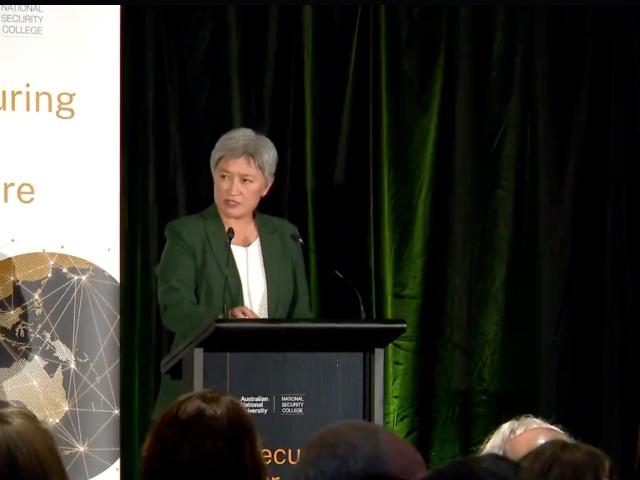In a notable departure from its previous stance, Australia is now contemplating the recognition of a Palestinian state, signaling a potential policy shift amidst global efforts to forge a two-state solution to the longstanding Israel-Palestinian conflict. During a speech at the Australian National University, Australian Foreign Minister Penny Wong echoed sentiments previously expressed by Britain's David Cameron, advocating for the recognition of Palestinian statehood, including at the United Nations, as a step to cement the two-state solution as an irreversible process.
Wong's remarks come at a time when the concept of Palestinian statehood is increasingly being discussed within the international community as a pivotal means of propelling momentum toward a two-state solution, a vision she champions as the sole viable path to ending the perpetual cycle of violence that has plagued the region. This vision aligns with the international consensus that has, for decades, seen the establishment of an independent Palestinian state alongside Israel as the cornerstone of peace efforts. Such a state could encompass the West Bank and East Jerusalem—territories occupied by Israel since the 1967 Middle East War—and would include the Gaza Strip. The problem is, since the signing of the Oslo Accords, Israel has made several offers to the Palestinians to which they have declined. Two of those offers were considered more than the Palestinians had asked for, and in former President Bill Clinton's assessment, showed that they never had any intention of forming a State.
Foreign Affairs Minister Penny Wong has given the Labor government's support to recognising Palestinian statehood in pursuit of long term peace in the region. https://t.co/o0LXry2B3c
— Sky News Australia (@SkyNewsAust) April 9, 2024
The journey towards peace and mutual recognition has been fraught with challenges. The peace process has notably faltered over the last decade, further complicated by the current hostilities in Gaza between Israel and Hamas, a Palestinian militant group. In this context, Israel recently solidified its stance against what it terms the "unilateral recognition" of a Palestinian state, insisting that any resolution must emerge from direct negotiations between the parties involved.
Foreign Minister Penny Wong has given the strongest indication yet that Australia could be open to considering recognition of a Palestinian state. @AmandaCoppNews #9News pic.twitter.com/nNrLRve8jk
— 9News Australia (@9NewsAUS) April 9, 2024
The discourse on Palestinian statehood is not limited to Australia and the UK; Spain, among other Western nations, is actively advocating for such recognition within the European Union, emphasizing the broad international interest in resolving the conflict through the establishment of two sovereign states.
Hamas freedom fighters | Free Palestine
— IAN KATZ I STAND WITH MY ISRAEL🇮🇱🌹💙💚 (@Tennispro1982) April 9, 2024
There you go Penny Wong: Israel’s peace partner for the urgent two state solution you talk about https://t.co/NaN14q4Qv0
Wong's statement also addresses the contentious issue of Hamas's role in the future Palestinian state, firmly excluding the militant group from any prospective governance structure. This position is in line with the broader international perspective that seeks a peaceful and stable Palestinian state that does not harbor militant factions.
The Palestinian Authority's recent move to seek full membership in the United Nations—a status that would elevate its current position as a non-member observer state akin to the Holy See—further underscores the urgency and complexity of the situation. The Security Council's referral of the Palestinian application to its admission committee signifies a crucial step in this contentious journey towards statehood.
Penny Wong makes an extraordinary suggestion about Palestine https://t.co/6t4CnClKMu via @MailOnline those of us who don’t have the brain the size of a pea or are woke zealots will not recognise Palestine for anything than it is a holding area for Islamic terrorist to hide out
— Denise Ravizza (@RavizzaDenise3) April 9, 2024
Wong's advocacy for recognizing a Palestinian state not as an act of concession to an adversary but as a strategic necessity for Israel's long-term security encapsulates the multifaceted approach needed to tackle this enduring conflict. She articulates a vision where peace and security for Israel are intrinsically linked to its acceptance by neighboring states, highlighting the interconnected fate of the nations within the region. This evolving dialogue, marked by Australia's potential policy shift, reflects a growing acknowledgment of the two-state solution's centrality in achieving lasting peace in the Middle East.


